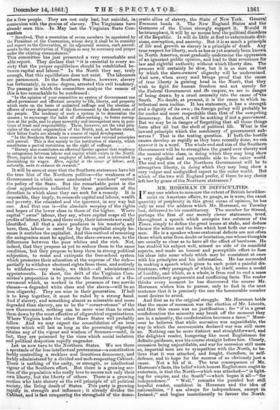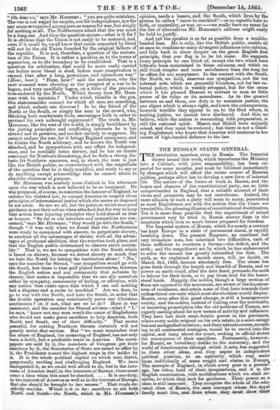MR. HORSMAN IN DIFFICULTIES.
IF any one wishes to measure the extent of British bewilder- ment nt on American affairs, to gauge, as it were, the exact quantity of perplexity in this great ocean of opinion, he has only to read the address which Mr. Horaman, on Tuesday last, delivered to his constituency. The member for Stroud, perhaps the first of our merely clever statesmen, tried, throughout a speech which occupies two columns of the Times, simply to define the great issues at stake, and deduce thence the action and the bias which best befit our country- men. He is a speaker whose oratorical defects are not often those which arise from doubt or hesitation, one whose thoughts are usually so clear as to have all the effect of hardness, He has studied his subject well, missed no side of its manifold aspects, and made an honest and perceptible effort to fuse his ideas into some whole which may be consistent at once with his principles and his information. He has succeeded in making a speech which gives to each point a painful dis- tinctness, every paragraph of which, by itself, seems a model of lucidity, and which, as a whole, is from end to end a mass of contradictory arguments and conflicting facts. The reader thinks every moment he has discovered the course Mr. Horaman wishes him to pursue, only to find in the next sentence that it is precisely the one the honourable member most desires to avoid.
And first as to the original struggle. Mr. Horsman holds that the cause of secession was the election of Mr. Lincoln, and that this cause was no justification ; for " if in a great confederation the minority may break of the moment they are in a minority, the confederation becomes a farce." More- over he believes that while secession was unjustifiable, the way in which the secessionists declared war was still more so. Nothing can be more distinct and straightforward, and the delighted reader, hungering like most Englishmen for definite guidance, sees his course straight before him. Clearly, secession being unjustifiable, and war for secession still more so, impartial men are to sympathize with the North, to be- lieve that it was attacked, and fought, therefore, in self- defence, and to hope for the success of so obviously just a cause. Not a bit of it. The true consequence of Mr. Horsman's facts, the belief which honest Englishmen ought to entertain, is that the North—which was attacked—" is fight- ing for empire, and the South"—which began it all—" for independence." " Well," remarks the puzzled but still hopeful reader, confident in Horaman and the idea of nationalities, " I am always for independence, except in Ireland ;" and begins incontinently to favour the North. " Oh dear no," says Mr. Horsman ; " you are quite mistaken. The war is not waged for empire, nor for independence, nor for any cause recognized among men as reason for war, but simply for nothing at all. The Northerners admit that the war must be a long one. And then the question occurs—what is it for ? It is obvious that the Union is not easily to be restored, and, even if it could be, we all know that union cemented by blood will not be the old Union founded by the original fathers of the republic. It is not, therefore, a question of the restora- tion of the Union. It is rather a question as to the terms of separation, as to the boundary to be established. That is a question for arbitration, that could be more easily carried out before more blood is shed, before more exasperation is caused, than after a long, pernicious, and calamitous war." (Hear, hear.) " Rear, hear!" said the audience, who the next moment were cheering at the prospect of a war to be begun, and very needfully begun, on a tithe of the provoca- tioteendured by the North. Which theory does Mr. Hors- man wish to maintain ? Under which thimble is the pea, this statesmanlike counsel for which all men are searching, and which nobody can discover? Is be the friend of the North or the South, or simply the man in the crowd, who, thinking both combatants fools, encourages both in order to pprrootract his own unbought enjoyment ? The truth is, Mr. Horamaa, like the rest of the world, is simply bewildered by the jarring principles and conflicting interests he is too shrewd not to perceive, and too fair entirely to suppress. He cannot endure the war, for it brings England annoyance, and he thinks the North arbitrary, and he knows the North was attacked, and he sympathizes with any effort for independ- ence, and he cordially hates slavery, and he has an innate contempt for Northern blundering, and be feels a strong dis- taste for Southern manners, and, in short, the man is just like the British public, so overwhelmed with the magnitude of the question that he is fairly muddled, and ready to say or, do anything except acknowledge that he cannot attain to absolute clearness of purpose. Mr. Horsman was scarcely more distinct in his utterance upon the war which is now believed to be so imminent. He was prepared, of course, to maintain the honour of England, to enforce the violated law, to compel America to respect those principles of international justice which she seems so disposed to set aside. So are we all, but the point on which men need guidance is not their action when attacked, but the way to keep that action from injuring principles they hold almost as dear as honour. " So far as our interests and sympathies are con- cerned," says Mr. Horsman, "they would go with the South," though " it was only when we found that the Northerners were ready to compound with slavery, to perpetuate slavery, to combine all the advantages of slavery with all the advan- tages of professed abolition, that the reaction took place, and that the English public determined to observe strict neutra- lity." That is, we are to sympathize with the South which is based on slavery, because we detest slavery so much that we hate the North for letting the institution alone ! "Na," says the member for Stroud, "our sympathies would go with the South, but there is that gulf placed between us, between the English nation and any community that subsists by slavery, that makes it impossible that we can ally ourselves either by sympathy, community of feeling, or affection, with any nation that exists upon that which I can call nothing but a disgrace and a aurae to mankind." Are we, then, to go to war with the North, and hate the South, in order that the double operation may conclusively prove our Christian sentiments ? or, if not, what are we to do? Here is war imminent, and the member for Stroud advises—what ? " I," he soya," know not any man worth the name of Englishman who would not make great sacrifices to help America, both North and South, out of their difficulty." That seems peaceful, for cutting Northern throats certainly will not greatly assist that section. But " we must remember that the abuse of England, the menacing of England, has not only been a habit, .but a profitable trade in America. The news- papers are sold by it, the members of Congress get their elections by it, the Secretaries of State are raised to office by it, the Presidents mount the highest steps in the ladder by it. It is the whole political capital on which men thrive, perpetually reviling and .challenging England. We have disregarded it, as we could well afford to do, but in the inte- rests of America itself, in the interests of Europe, there must come a time when this must be checked. . . . It is our duty, in the interest of America as well as in theinterest of Europe, that she should be brought to her senses." That reads de- cidedly -warlike. Which is it to be : sacrifices to aid both North and South—the North, which in Mr. Horsman's opinion, needs a lesson, and the South, which lives by the system he calls a " curse to mankind"—or an equable hate to both, or neutrality, or war, or—we really have no space for the list of alternatives Mr. Horsman's address might easily be held to justify. And yet the speaker is as far as possible from a muddle- headed man. He is only, like the British public, unable all at once to combine so many divergent influences into opinion, and falls back in sheer despair on the great English first principle, that our flag is to be let alone. He suggests every principle he can think of, except,the two which have hitherto been maintained in these columns, and which we still think simpler and more satisfactory than the long list he offers for our acceptance. In the contest with the South, the North, we hold, deserves our sympathies, not for her internal acts, which are generally blunders, not for her ex- ternal policy, which is weakly arrogant, but for the cause which it has pleased Heaven to entrust to men so little aware of its value or its sacredness. As to the quarrel between us and them, our duty is to maintain justice, the one object which is always right, and leave the consequences, however terrible they appear to us, to the God whom, in seeking justice, we cannot have disobeyed. And this, we believe, while the nation is resounding with preparation, is still the national spirit. Mason and Slidell were unjustly seized, and they must be restored ; but thernis not a think- ing Englishman who hopes that America will continue in her course of high-handed defiance to the law.































 Previous page
Previous page